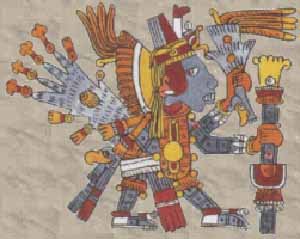Latin@ Role Models and Academic Identity
In an interview with the cartoonist/author of "La Cucaracha" and Pocho.com's Lalo Alcaraz, the Latin@ Graduate gets at the issue of representation that Alcaraz faced in high school. Bussed to what Luis Urrieta Jr. would call a "whitestream" school, Alcaraz explains he was the only Latino to graduate from his bussed-in cohort.
When attending San Diego State University (home of Tex[t]-Mex czar/prof. Bill Nerricio), Alcaraz acknowledges the supportive role that MECHA played because the other students has similar experiences to what Alcaraz was going through as an undergrad.
(art copyright Lalo Alcaraz, on the LatinoGraduate.net website)
Read the entire article and see some more of Alcaraz' art at:
http://www.latinograduate.net/new/rolemodels/alcaraz.shtml
Or of course check out Alcaraz's website at:
http://www.pocho.com/
When discussing an academic identity, there are many factors to consider. Alcaraz's experience as one of few Latin@s makes his background very much different from some of the students I speak with, who are from predominantly Latin@ schools, but feel the stark contrast in college of being one of few Latin@s.
Showing posts with label cruz medina pochteca. Show all posts
Showing posts with label cruz medina pochteca. Show all posts
Thursday, March 3, 2011
Tuesday, March 1, 2011
Pochteca Deity Yacatecuhtli
From: Aztec Mythology: The Influence of Aztec Mythology on Mexican Culture and History

Description of the Yacatecuhtli:
"Yacatecuhtli, like the Greek Hermes, is the god of merchants, traders and travelers. He is pictured with white and black facial decorations, his hair is bound in a high sheaf, and he carries a staff and a flywhisk. He is honored by having his statues wrapped in paper wherever they are found. Merchants hold their walking stick, a massive cane called an utlatl in high esteem. They carry these walking sticks when traveling and when they arrive at a place they are to sleep, they gather all of their sticks in one bundle and tie them together, lay them at the head where they are to sleep and spill drops of blood in front of them from their tongue, ears or arms and legs; they offer copal and light a fire that burns before the walking sticks which they hold as the image of the god himself. This is their way of asking for the god’s protection from all dangers. (Restored by the author from the Codex Fejervany Mayer)"

I'm not sure how the deity of the pochteca affects the embodied rhetoric of the pochteca as a figure. Although Dolores Delgado Bernal has looked at the role of spirituality in the academic identity of Latin@ students, so this could be an aspect to consider.
By: James W. Salterio Torres

Description of the Yacatecuhtli:
"Yacatecuhtli, like the Greek Hermes, is the god of merchants, traders and travelers. He is pictured with white and black facial decorations, his hair is bound in a high sheaf, and he carries a staff and a flywhisk. He is honored by having his statues wrapped in paper wherever they are found. Merchants hold their walking stick, a massive cane called an utlatl in high esteem. They carry these walking sticks when traveling and when they arrive at a place they are to sleep, they gather all of their sticks in one bundle and tie them together, lay them at the head where they are to sleep and spill drops of blood in front of them from their tongue, ears or arms and legs; they offer copal and light a fire that burns before the walking sticks which they hold as the image of the god himself. This is their way of asking for the god’s protection from all dangers. (Restored by the author from the Codex Fejervany Mayer)"

I'm not sure how the deity of the pochteca affects the embodied rhetoric of the pochteca as a figure. Although Dolores Delgado Bernal has looked at the role of spirituality in the academic identity of Latin@ students, so this could be an aspect to consider.
Labels:
cruz medina,
cruz medina pocho rhetoric,
cruz medina pochoteca,
cruz medina pochteca,
pochoteca,
pochteca,
yacatecuhtli
Subscribe to:
Posts (Atom)
![poch[o]tec@](https://blogger.googleusercontent.com/img/b/R29vZ2xl/AVvXsEivFXAwf95ClTX2VO56clHOa27NUAuNgP2hWo8RhgWmzxl3q-2a2GgQPKVdOfhdfHgu8ompU7BmuFO-DQJ0K0BS5cKNAv9bdwbpAjQve0uFyLg6d66hhSMyRBytZSKvD53J0g1Ymxn2rS_8/s1600/pochoteca+2.jpg)
